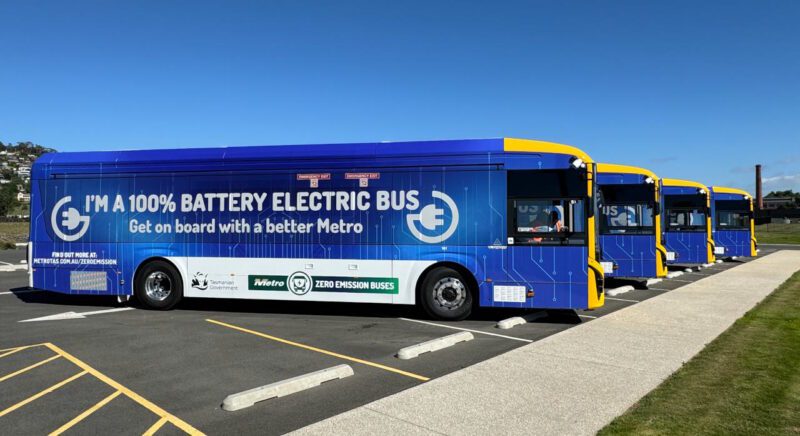Tasmania’s state-owned public transport operator Metro Tasmania has unveiled four new electric buses which will be trialled over a two-year period in the state’s second-largest city, Launceston.
Continuing the trend of “trialling” electric buses that is popular with local and state governments across Australia (why don’t they just go out and buy a whole heap?), Metro Tasmania announced late last week the start of its new battery electric bus (BEB) trial in Launceston.
The four Element 2 electric buses, made by New South Wales bus manufacturer Custom Denning, entered operation ahead of Australia Day and will spend the next two years providing data on how electric buses manage Tasmania’s unique weather and terrain.
The BEB trial is backed by $6 million from the Tasmania Liberal Government.
“We have set an ambitious target of net zero emissions, or lower, from 2030,” said Roger Jaensch, Tasmanian minister for environment and climate change.
“Transport accounts for some 21% of our state-wide emissions, so trialling zero emissions public transport options is an important part of our journey …. it will provide us with valuable information to inform future investment in our public transport fleet.”
Part of Metro’s larger Zero Emission Bus (ZEB) Trial, the company is also planning a trial of three hydrogen electric buses in the state’s capital of Hobart.
The state government has also approved $11.3 million from the Tasmanian Renewable Hydrogen Industry Development Funding Program for the trial.
“Buses have a useful life of about 20 years,” said Michael Ferguson, Tasmanian minister for infrastructure and transport.
“Because these are a long-term investment decision, it is important to consider as much relevant information as possible, before making a decision.”
Australia nevertheless remains behind the eight-ball, in terms of these public transport trials – due in large part to the nearly decade-long delay of clean technology adoption caused by the Liberal Party’s antipathy towards climate science.
In other parts of the world, where governments long ago accepted the warnings of climate scientists and the economic value of clean technology, similar trials have already been conducted, and the results are becoming increasingly unanimous in favour of battery electric buses.
In the past two years, hydrogen bus trials and operations have been aborted in favour of battery electric buses in the French cities of Montpellier and Pau and a hydrogen fuel-cell train system was cancelled in favour of battery electric trains in the German state of Lower Saxony.
Joshua S. Hill is a Melbourne-based journalist who has been writing about climate change, clean technology, and electric vehicles for over 15 years. He has been reporting on electric vehicles and clean technologies for Renew Economy and The Driven since 2012. His preferred mode of transport is his feet.

